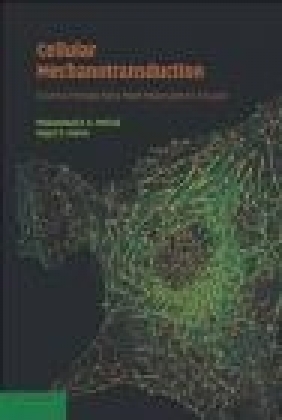Cellular Mechanotransduction
Cellular Mechanotransduction
- Wydawnictwo: Cambridge University Press
- Rok wydania: 2014
- ISBN: 9781107682467
- Ilość stron: 494
- Oprawa: Miękka
Niedostępna
Opis: Cellular Mechanotransduction
'Mechanotransduction' is the term for the ability, first described by 19th-century anatomist Julius Wolff, of living tissues to sense mechanical stress and respond by tissue remodeling. More recently, the scope of mechanotransduction has been expanded to include the sensation of stress, its translation into a biochemical signal, and the sequence of biological responses it produces. This book looks at mechanotransduction in a more restricted sense, focusing on the process of stress sensing and transducing a mechanical force into a cascade of biochemical signals. This stress has become increasingly recognized as one of the primary and essential factors controlling biological functions, ultimately affecting the function of the cells, tissues, and organs. A primary goal of this broad book is also to help define the new field of mechanomics, which attempts to describe the complete mechanical state of a biological system.1. Introduction Roger D. Kamm and Mohammad R. K. Mofrad; 2. Endothelial mechanotransduction Peter F. Davies and Brian P. Helmke; 3. Role of the plasma membrane in endothelial cell mechanosensation of shear stress Peter J. Butler and Shu Chien; 4. Mechanotransduction by membrane mediated activation of G protein coupled receptors and G proteins Yan-Liang Zhang, John A. Frangos and Mirianas Chachisvilis; 5. Cellular mechanotransduction: interactions with the extracellular matrix Andrew D. Doyle and Kenneth M. Yamada; 6. Role of ion channels in cellular mechanotransduction: lessons from the vascular endothelium Abdul I. Barakat and Andrea Gojova; 7. Towards a modular analysis of cell mechano-sensing and transduction: an operations manual for cell mechanics Benjamin J. Dubin-Thaler and Michael P. Sheetz; 8. Tensegrity as a mechanism for integrating molecular and cellular mechanotransduction mechanisms Donald E. Ingber; 9. Nuclear mechanics and mechanotransduction Shinji Deguchi and Masaaki Sato; 10. Microtubule bending and breaking in cellular mechanotransduction Andrew D. Bicek, Dominique Seetapun, and David J. Odde; 11. A molecular perspective on mechanotransduction in focal adhesions Seung E. Lee, Roger D. Kamm and Mohammad R. K. Mofrad; 12. Protein conformational change: a molecular basis of mechanotransduction Gang Bao; 13. Translating mechanical force into discrete biochemical signal changes: multimodularity imposes unique properties to mechanotransductive proteins Vesa P. Hytonen, Michael L. Smith and Viola Vogel; 14. Mechanotransduction through local autocrine signaling Nikola Kojic and Daniel J. Tschumperlin; 15. The interaction between fluid-wall shear stress and solid circumferential strain affects endothelial cell mechanobiology John M. Tarbell; 16. Micro- and nanoscale force techniques for mechanotransduction Nathan J. Sniadecki, Wesley R. Legant and Christopher S. Chen; 17. Mechanical regulation of stem cells: implications in tissue remodeling Kyle Kurpinski, Randall R. R. Janairo, Shu Chien and Song Li; 18. Mechanotransduction: role of nuclear pore mechanics and nucleocytoplasmic transport Christopher B. Wolf and Mohammad R. K. Mofrad; 19. Summary and outlook Mohammad R. K. Mofrad and Roger D. Kamm.
Producent:
Cambridge University Press
José Abascal 56 lok. 1°
28003 Madrid (ES)
tel: +34 91 171 58 00
email: [email protected]
Szczegóły: Cellular Mechanotransduction
Tytuł: Cellular Mechanotransduction
Wydawnictwo: Cambridge University Press
ISBN: 9781107682467
Rok wydania: 2014
Ilość stron: 494
Oprawa: Miękka
Waga: 0.85 kg
























